Study and Employment Skills Audit Report: Fundraising Project Analysis
VerifiedAdded on 2020/12/10
|11
|2987
|181
Report
AI Summary
This report presents a comprehensive skills audit conducted by a student involved in a fundraising project for the Teenage Cancer Trust. The introduction provides background on the charity and the project's goals. The report then evaluates key skills developed through the project, including teamwork, planning, research, problem-solving, and organization. It details the student's individual contributions, such as decision-making, research, and communication, and assesses overall team performance. The report further explores personal development, highlighting improvements in teamwork, communication, decision-making, work ethic, and empathy. The student applies Honey and Mumford's model of reflection to analyze their learning style and experiences within the team. Finally, the report examines both qualitative and quantitative evidence used to measure project success, such as peer feedback and fundraising totals, demonstrating the impact of the project and the student's growth.
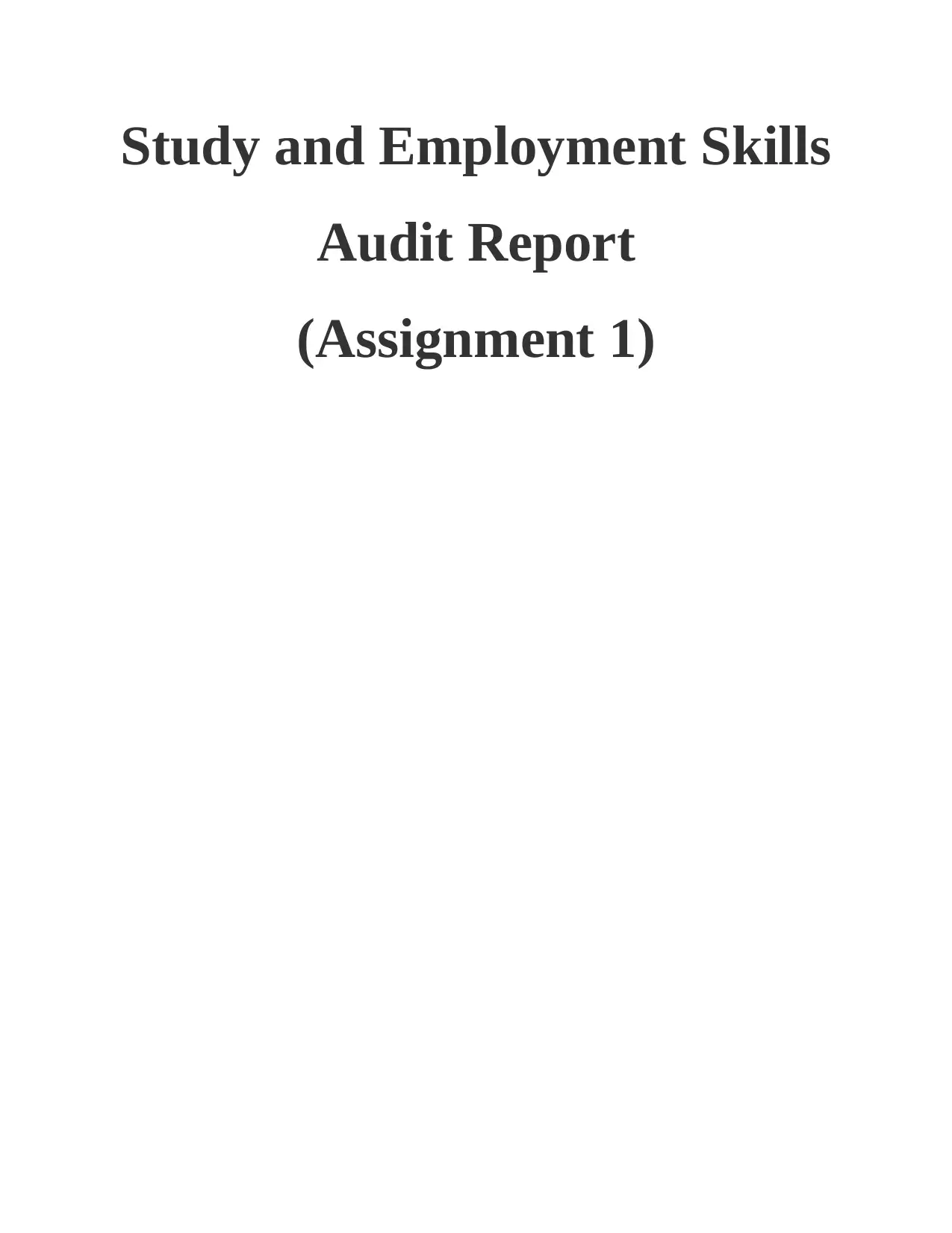
Study and Employment Skills
Audit Report
(Assignment 1)
Audit Report
(Assignment 1)
Paraphrase This Document
Need a fresh take? Get an instant paraphrase of this document with our AI Paraphraser
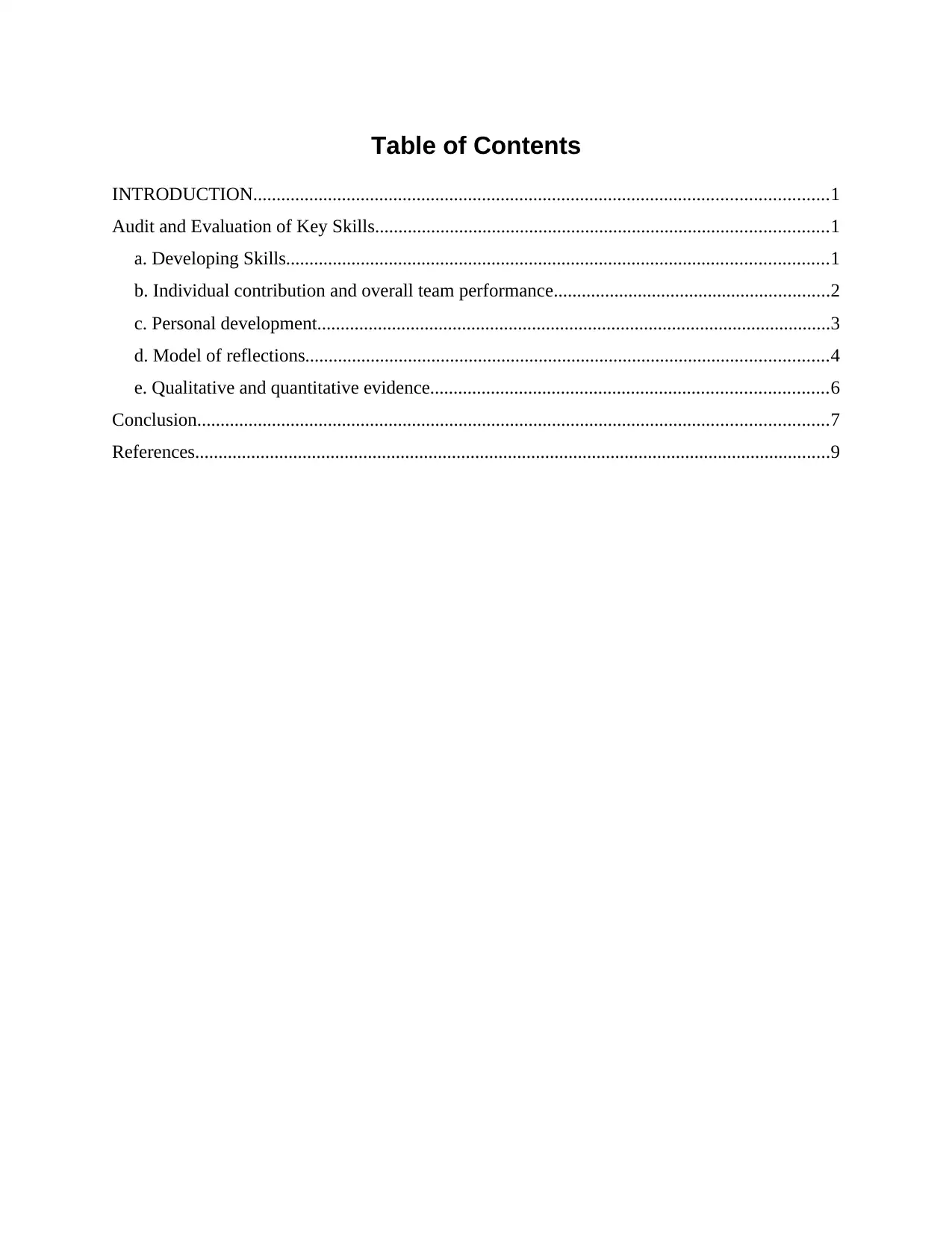
Table of Contents
INTRODUCTION...........................................................................................................................1
Audit and Evaluation of Key Skills.................................................................................................1
a. Developing Skills....................................................................................................................1
b. Individual contribution and overall team performance...........................................................2
c. Personal development..............................................................................................................3
d. Model of reflections................................................................................................................4
e. Qualitative and quantitative evidence.....................................................................................6
Conclusion.......................................................................................................................................7
References........................................................................................................................................9
INTRODUCTION...........................................................................................................................1
Audit and Evaluation of Key Skills.................................................................................................1
a. Developing Skills....................................................................................................................1
b. Individual contribution and overall team performance...........................................................2
c. Personal development..............................................................................................................3
d. Model of reflections................................................................................................................4
e. Qualitative and quantitative evidence.....................................................................................6
Conclusion.......................................................................................................................................7
References........................................................................................................................................9
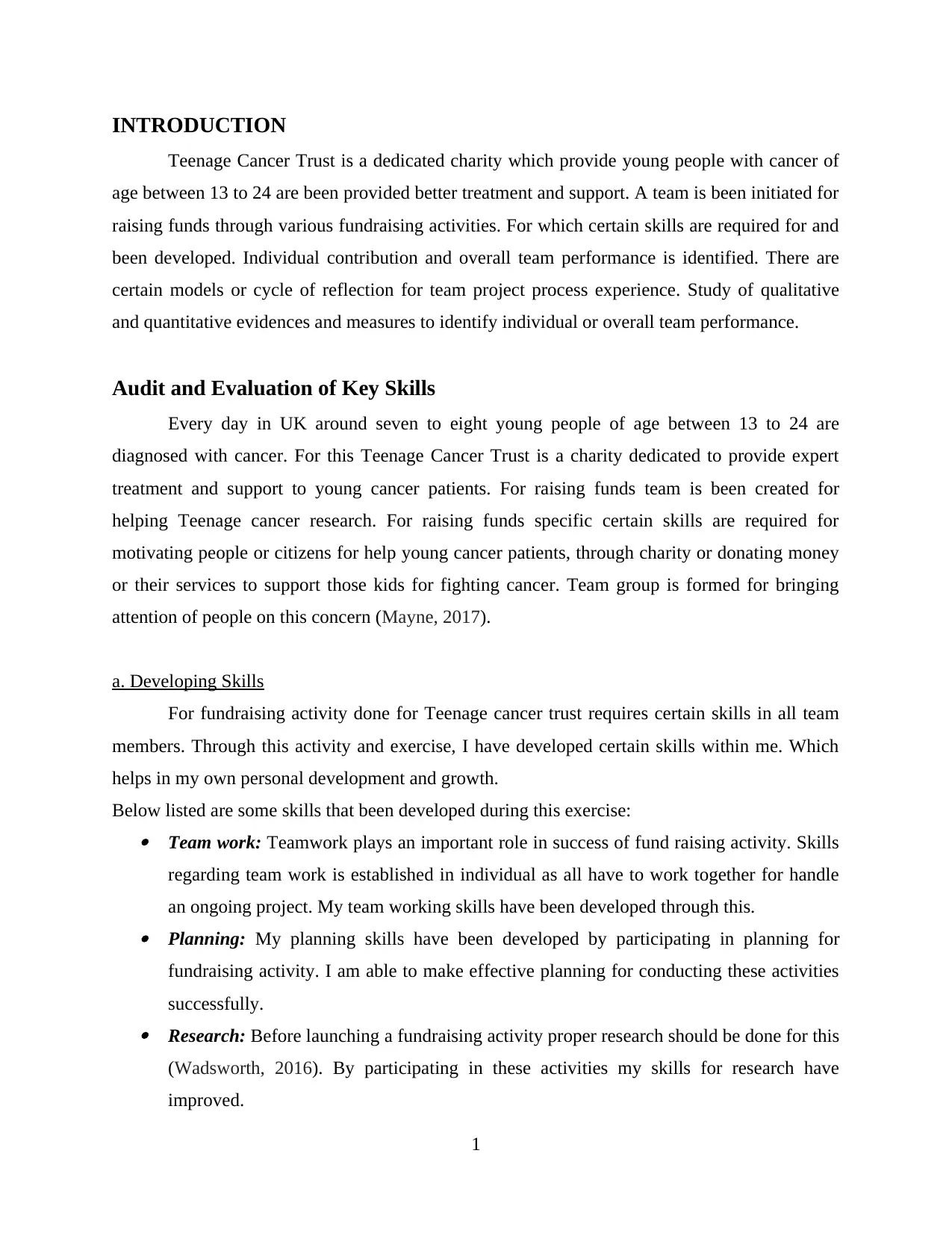
INTRODUCTION
Teenage Cancer Trust is a dedicated charity which provide young people with cancer of
age between 13 to 24 are been provided better treatment and support. A team is been initiated for
raising funds through various fundraising activities. For which certain skills are required for and
been developed. Individual contribution and overall team performance is identified. There are
certain models or cycle of reflection for team project process experience. Study of qualitative
and quantitative evidences and measures to identify individual or overall team performance.
Audit and Evaluation of Key Skills
Every day in UK around seven to eight young people of age between 13 to 24 are
diagnosed with cancer. For this Teenage Cancer Trust is a charity dedicated to provide expert
treatment and support to young cancer patients. For raising funds team is been created for
helping Teenage cancer research. For raising funds specific certain skills are required for
motivating people or citizens for help young cancer patients, through charity or donating money
or their services to support those kids for fighting cancer. Team group is formed for bringing
attention of people on this concern (Mayne, 2017).
a. Developing Skills
For fundraising activity done for Teenage cancer trust requires certain skills in all team
members. Through this activity and exercise, I have developed certain skills within me. Which
helps in my own personal development and growth.
Below listed are some skills that been developed during this exercise: Team work: Teamwork plays an important role in success of fund raising activity. Skills
regarding team work is established in individual as all have to work together for handle
an ongoing project. My team working skills have been developed through this. Planning: My planning skills have been developed by participating in planning for
fundraising activity. I am able to make effective planning for conducting these activities
successfully. Research: Before launching a fundraising activity proper research should be done for this
(Wadsworth, 2016). By participating in these activities my skills for research have
improved.
1
Teenage Cancer Trust is a dedicated charity which provide young people with cancer of
age between 13 to 24 are been provided better treatment and support. A team is been initiated for
raising funds through various fundraising activities. For which certain skills are required for and
been developed. Individual contribution and overall team performance is identified. There are
certain models or cycle of reflection for team project process experience. Study of qualitative
and quantitative evidences and measures to identify individual or overall team performance.
Audit and Evaluation of Key Skills
Every day in UK around seven to eight young people of age between 13 to 24 are
diagnosed with cancer. For this Teenage Cancer Trust is a charity dedicated to provide expert
treatment and support to young cancer patients. For raising funds team is been created for
helping Teenage cancer research. For raising funds specific certain skills are required for
motivating people or citizens for help young cancer patients, through charity or donating money
or their services to support those kids for fighting cancer. Team group is formed for bringing
attention of people on this concern (Mayne, 2017).
a. Developing Skills
For fundraising activity done for Teenage cancer trust requires certain skills in all team
members. Through this activity and exercise, I have developed certain skills within me. Which
helps in my own personal development and growth.
Below listed are some skills that been developed during this exercise: Team work: Teamwork plays an important role in success of fund raising activity. Skills
regarding team work is established in individual as all have to work together for handle
an ongoing project. My team working skills have been developed through this. Planning: My planning skills have been developed by participating in planning for
fundraising activity. I am able to make effective planning for conducting these activities
successfully. Research: Before launching a fundraising activity proper research should be done for this
(Wadsworth, 2016). By participating in these activities my skills for research have
improved.
1
⊘ This is a preview!⊘
Do you want full access?
Subscribe today to unlock all pages.

Trusted by 1+ million students worldwide
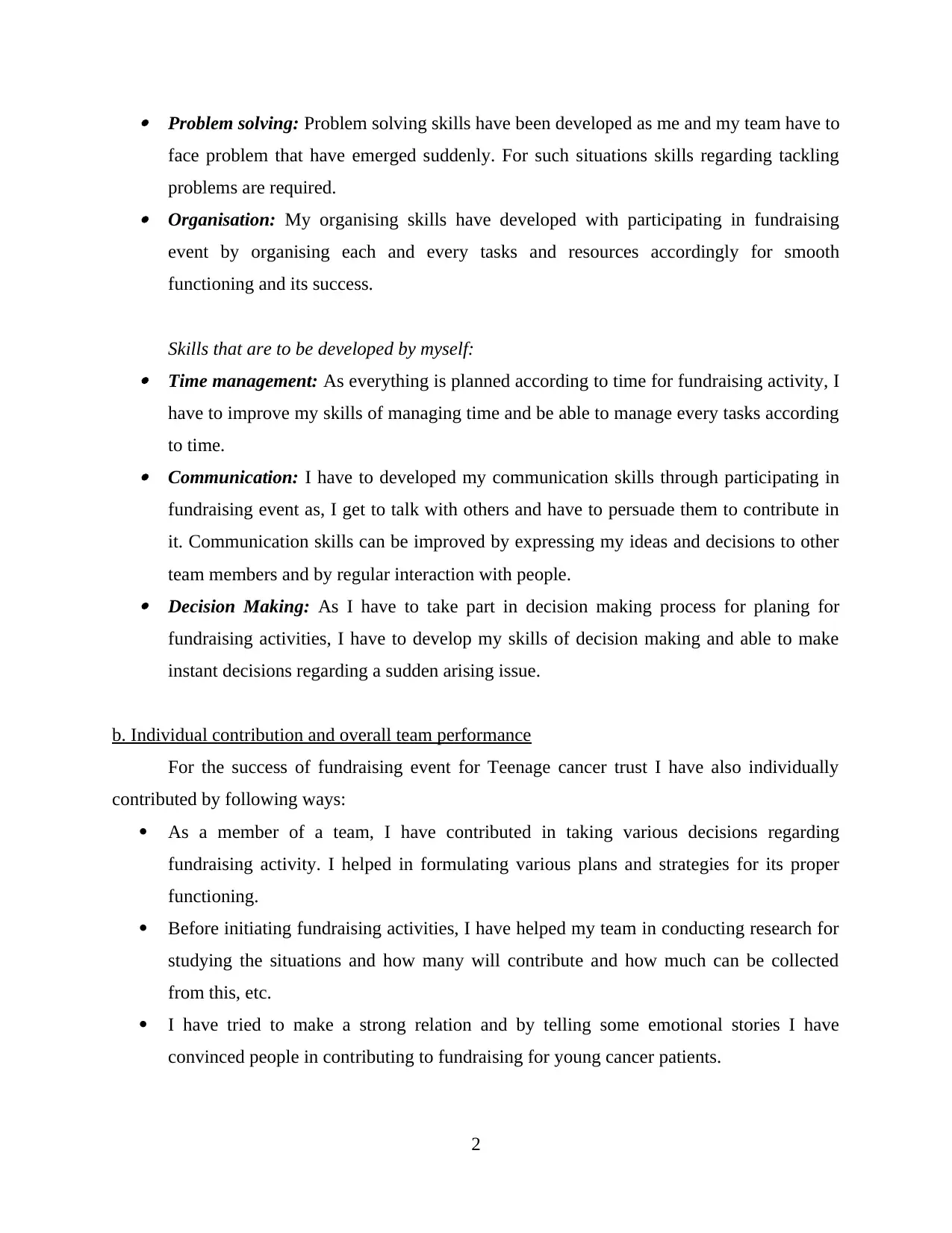
Problem solving: Problem solving skills have been developed as me and my team have to
face problem that have emerged suddenly. For such situations skills regarding tackling
problems are required. Organisation: My organising skills have developed with participating in fundraising
event by organising each and every tasks and resources accordingly for smooth
functioning and its success.
Skills that are to be developed by myself: Time management: As everything is planned according to time for fundraising activity, I
have to improve my skills of managing time and be able to manage every tasks according
to time. Communication: I have to developed my communication skills through participating in
fundraising event as, I get to talk with others and have to persuade them to contribute in
it. Communication skills can be improved by expressing my ideas and decisions to other
team members and by regular interaction with people. Decision Making: As I have to take part in decision making process for planing for
fundraising activities, I have to develop my skills of decision making and able to make
instant decisions regarding a sudden arising issue.
b. Individual contribution and overall team performance
For the success of fundraising event for Teenage cancer trust I have also individually
contributed by following ways:
As a member of a team, I have contributed in taking various decisions regarding
fundraising activity. I helped in formulating various plans and strategies for its proper
functioning.
Before initiating fundraising activities, I have helped my team in conducting research for
studying the situations and how many will contribute and how much can be collected
from this, etc.
I have tried to make a strong relation and by telling some emotional stories I have
convinced people in contributing to fundraising for young cancer patients.
2
face problem that have emerged suddenly. For such situations skills regarding tackling
problems are required. Organisation: My organising skills have developed with participating in fundraising
event by organising each and every tasks and resources accordingly for smooth
functioning and its success.
Skills that are to be developed by myself: Time management: As everything is planned according to time for fundraising activity, I
have to improve my skills of managing time and be able to manage every tasks according
to time. Communication: I have to developed my communication skills through participating in
fundraising event as, I get to talk with others and have to persuade them to contribute in
it. Communication skills can be improved by expressing my ideas and decisions to other
team members and by regular interaction with people. Decision Making: As I have to take part in decision making process for planing for
fundraising activities, I have to develop my skills of decision making and able to make
instant decisions regarding a sudden arising issue.
b. Individual contribution and overall team performance
For the success of fundraising event for Teenage cancer trust I have also individually
contributed by following ways:
As a member of a team, I have contributed in taking various decisions regarding
fundraising activity. I helped in formulating various plans and strategies for its proper
functioning.
Before initiating fundraising activities, I have helped my team in conducting research for
studying the situations and how many will contribute and how much can be collected
from this, etc.
I have tried to make a strong relation and by telling some emotional stories I have
convinced people in contributing to fundraising for young cancer patients.
2
Paraphrase This Document
Need a fresh take? Get an instant paraphrase of this document with our AI Paraphraser
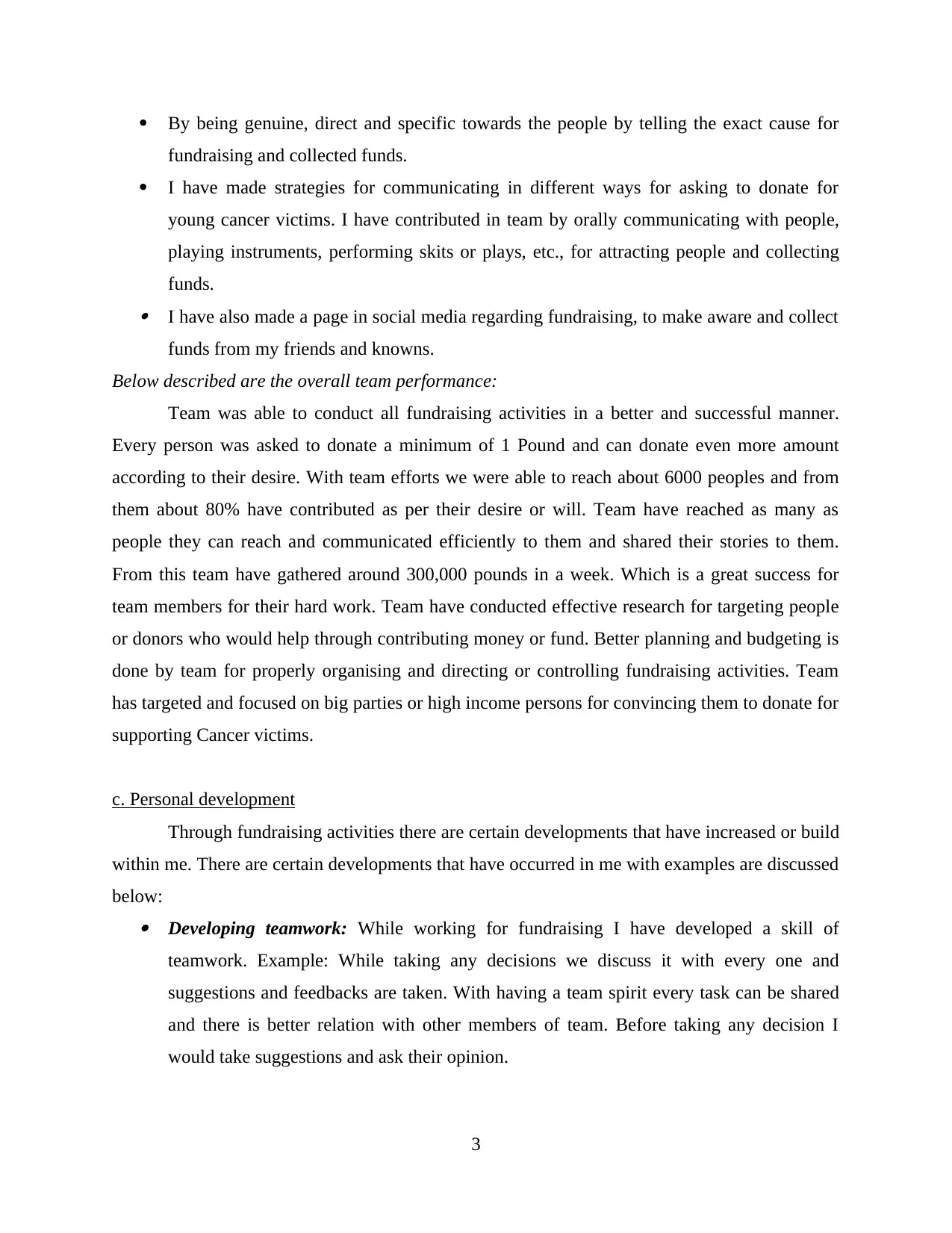
By being genuine, direct and specific towards the people by telling the exact cause for
fundraising and collected funds.
I have made strategies for communicating in different ways for asking to donate for
young cancer victims. I have contributed in team by orally communicating with people,
playing instruments, performing skits or plays, etc., for attracting people and collecting
funds. I have also made a page in social media regarding fundraising, to make aware and collect
funds from my friends and knowns.
Below described are the overall team performance:
Team was able to conduct all fundraising activities in a better and successful manner.
Every person was asked to donate a minimum of 1 Pound and can donate even more amount
according to their desire. With team efforts we were able to reach about 6000 peoples and from
them about 80% have contributed as per their desire or will. Team have reached as many as
people they can reach and communicated efficiently to them and shared their stories to them.
From this team have gathered around 300,000 pounds in a week. Which is a great success for
team members for their hard work. Team have conducted effective research for targeting people
or donors who would help through contributing money or fund. Better planning and budgeting is
done by team for properly organising and directing or controlling fundraising activities. Team
has targeted and focused on big parties or high income persons for convincing them to donate for
supporting Cancer victims.
c. Personal development
Through fundraising activities there are certain developments that have increased or build
within me. There are certain developments that have occurred in me with examples are discussed
below: Developing teamwork: While working for fundraising I have developed a skill of
teamwork. Example: While taking any decisions we discuss it with every one and
suggestions and feedbacks are taken. With having a team spirit every task can be shared
and there is better relation with other members of team. Before taking any decision I
would take suggestions and ask their opinion.
3
fundraising and collected funds.
I have made strategies for communicating in different ways for asking to donate for
young cancer victims. I have contributed in team by orally communicating with people,
playing instruments, performing skits or plays, etc., for attracting people and collecting
funds. I have also made a page in social media regarding fundraising, to make aware and collect
funds from my friends and knowns.
Below described are the overall team performance:
Team was able to conduct all fundraising activities in a better and successful manner.
Every person was asked to donate a minimum of 1 Pound and can donate even more amount
according to their desire. With team efforts we were able to reach about 6000 peoples and from
them about 80% have contributed as per their desire or will. Team have reached as many as
people they can reach and communicated efficiently to them and shared their stories to them.
From this team have gathered around 300,000 pounds in a week. Which is a great success for
team members for their hard work. Team have conducted effective research for targeting people
or donors who would help through contributing money or fund. Better planning and budgeting is
done by team for properly organising and directing or controlling fundraising activities. Team
has targeted and focused on big parties or high income persons for convincing them to donate for
supporting Cancer victims.
c. Personal development
Through fundraising activities there are certain developments that have increased or build
within me. There are certain developments that have occurred in me with examples are discussed
below: Developing teamwork: While working for fundraising I have developed a skill of
teamwork. Example: While taking any decisions we discuss it with every one and
suggestions and feedbacks are taken. With having a team spirit every task can be shared
and there is better relation with other members of team. Before taking any decision I
would take suggestions and ask their opinion.
3
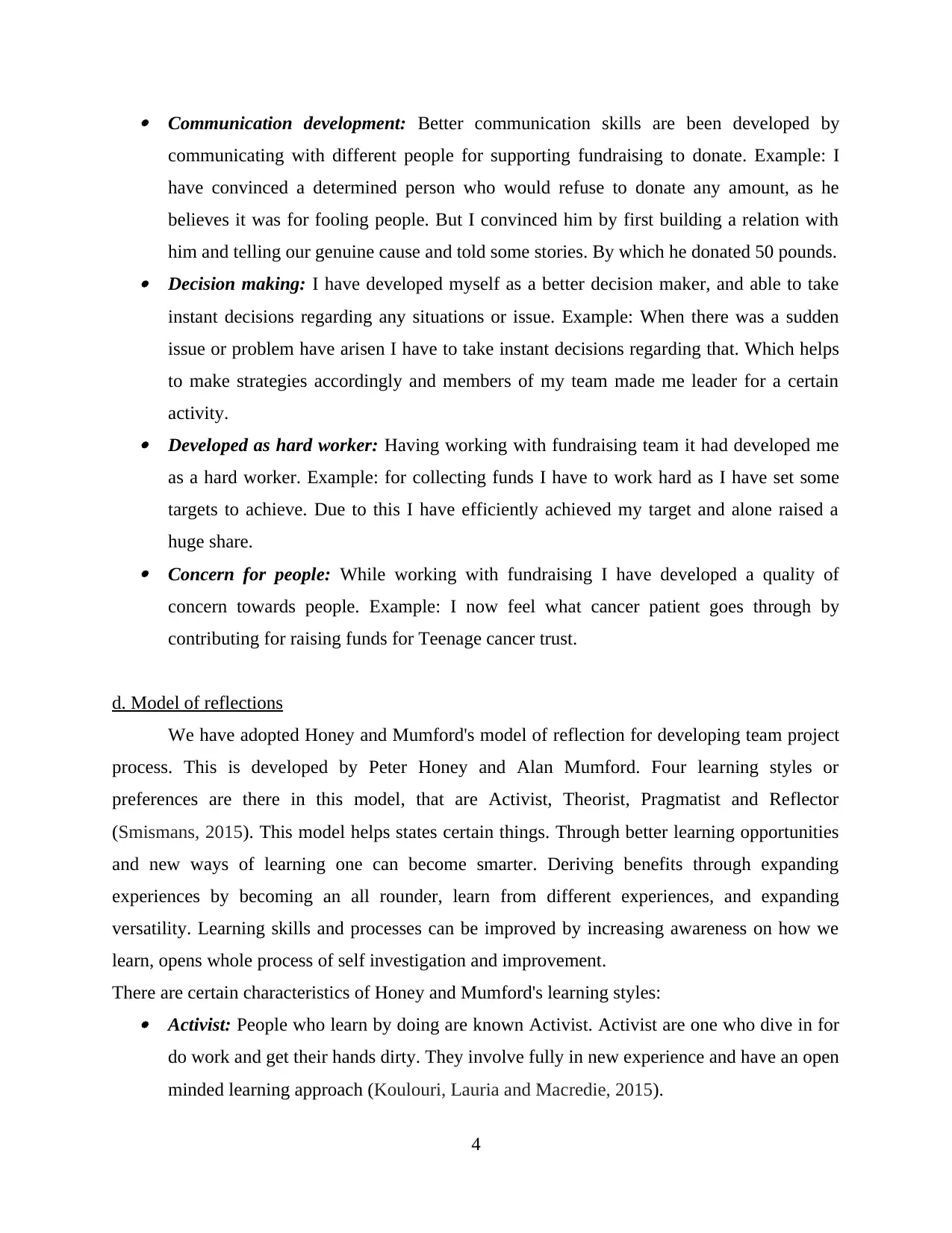
Communication development: Better communication skills are been developed by
communicating with different people for supporting fundraising to donate. Example: I
have convinced a determined person who would refuse to donate any amount, as he
believes it was for fooling people. But I convinced him by first building a relation with
him and telling our genuine cause and told some stories. By which he donated 50 pounds. Decision making: I have developed myself as a better decision maker, and able to take
instant decisions regarding any situations or issue. Example: When there was a sudden
issue or problem have arisen I have to take instant decisions regarding that. Which helps
to make strategies accordingly and members of my team made me leader for a certain
activity. Developed as hard worker: Having working with fundraising team it had developed me
as a hard worker. Example: for collecting funds I have to work hard as I have set some
targets to achieve. Due to this I have efficiently achieved my target and alone raised a
huge share. Concern for people: While working with fundraising I have developed a quality of
concern towards people. Example: I now feel what cancer patient goes through by
contributing for raising funds for Teenage cancer trust.
d. Model of reflections
We have adopted Honey and Mumford's model of reflection for developing team project
process. This is developed by Peter Honey and Alan Mumford. Four learning styles or
preferences are there in this model, that are Activist, Theorist, Pragmatist and Reflector
(Smismans, 2015). This model helps states certain things. Through better learning opportunities
and new ways of learning one can become smarter. Deriving benefits through expanding
experiences by becoming an all rounder, learn from different experiences, and expanding
versatility. Learning skills and processes can be improved by increasing awareness on how we
learn, opens whole process of self investigation and improvement.
There are certain characteristics of Honey and Mumford's learning styles: Activist: People who learn by doing are known Activist. Activist are one who dive in for
do work and get their hands dirty. They involve fully in new experience and have an open
minded learning approach (Koulouri, Lauria and Macredie, 2015).
4
communicating with different people for supporting fundraising to donate. Example: I
have convinced a determined person who would refuse to donate any amount, as he
believes it was for fooling people. But I convinced him by first building a relation with
him and telling our genuine cause and told some stories. By which he donated 50 pounds. Decision making: I have developed myself as a better decision maker, and able to take
instant decisions regarding any situations or issue. Example: When there was a sudden
issue or problem have arisen I have to take instant decisions regarding that. Which helps
to make strategies accordingly and members of my team made me leader for a certain
activity. Developed as hard worker: Having working with fundraising team it had developed me
as a hard worker. Example: for collecting funds I have to work hard as I have set some
targets to achieve. Due to this I have efficiently achieved my target and alone raised a
huge share. Concern for people: While working with fundraising I have developed a quality of
concern towards people. Example: I now feel what cancer patient goes through by
contributing for raising funds for Teenage cancer trust.
d. Model of reflections
We have adopted Honey and Mumford's model of reflection for developing team project
process. This is developed by Peter Honey and Alan Mumford. Four learning styles or
preferences are there in this model, that are Activist, Theorist, Pragmatist and Reflector
(Smismans, 2015). This model helps states certain things. Through better learning opportunities
and new ways of learning one can become smarter. Deriving benefits through expanding
experiences by becoming an all rounder, learn from different experiences, and expanding
versatility. Learning skills and processes can be improved by increasing awareness on how we
learn, opens whole process of self investigation and improvement.
There are certain characteristics of Honey and Mumford's learning styles: Activist: People who learn by doing are known Activist. Activist are one who dive in for
do work and get their hands dirty. They involve fully in new experience and have an open
minded learning approach (Koulouri, Lauria and Macredie, 2015).
4
⊘ This is a preview!⊘
Do you want full access?
Subscribe today to unlock all pages.

Trusted by 1+ million students worldwide
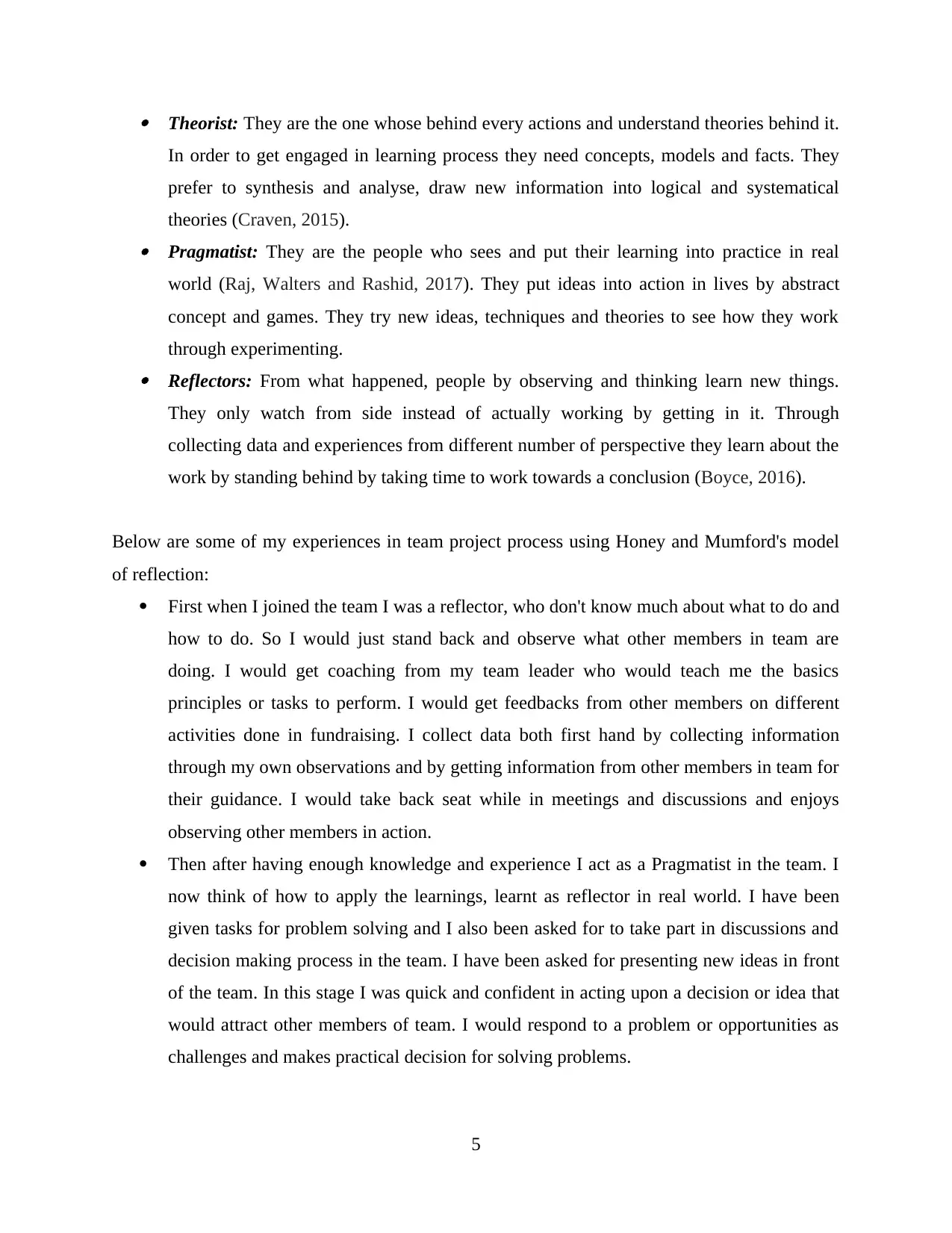
Theorist: They are the one whose behind every actions and understand theories behind it.
In order to get engaged in learning process they need concepts, models and facts. They
prefer to synthesis and analyse, draw new information into logical and systematical
theories (Craven, 2015). Pragmatist: They are the people who sees and put their learning into practice in real
world (Raj, Walters and Rashid, 2017). They put ideas into action in lives by abstract
concept and games. They try new ideas, techniques and theories to see how they work
through experimenting. Reflectors: From what happened, people by observing and thinking learn new things.
They only watch from side instead of actually working by getting in it. Through
collecting data and experiences from different number of perspective they learn about the
work by standing behind by taking time to work towards a conclusion (Boyce, 2016).
Below are some of my experiences in team project process using Honey and Mumford's model
of reflection:
First when I joined the team I was a reflector, who don't know much about what to do and
how to do. So I would just stand back and observe what other members in team are
doing. I would get coaching from my team leader who would teach me the basics
principles or tasks to perform. I would get feedbacks from other members on different
activities done in fundraising. I collect data both first hand by collecting information
through my own observations and by getting information from other members in team for
their guidance. I would take back seat while in meetings and discussions and enjoys
observing other members in action.
Then after having enough knowledge and experience I act as a Pragmatist in the team. I
now think of how to apply the learnings, learnt as reflector in real world. I have been
given tasks for problem solving and I also been asked for to take part in discussions and
decision making process in the team. I have been asked for presenting new ideas in front
of the team. In this stage I was quick and confident in acting upon a decision or idea that
would attract other members of team. I would respond to a problem or opportunities as
challenges and makes practical decision for solving problems.
5
In order to get engaged in learning process they need concepts, models and facts. They
prefer to synthesis and analyse, draw new information into logical and systematical
theories (Craven, 2015). Pragmatist: They are the people who sees and put their learning into practice in real
world (Raj, Walters and Rashid, 2017). They put ideas into action in lives by abstract
concept and games. They try new ideas, techniques and theories to see how they work
through experimenting. Reflectors: From what happened, people by observing and thinking learn new things.
They only watch from side instead of actually working by getting in it. Through
collecting data and experiences from different number of perspective they learn about the
work by standing behind by taking time to work towards a conclusion (Boyce, 2016).
Below are some of my experiences in team project process using Honey and Mumford's model
of reflection:
First when I joined the team I was a reflector, who don't know much about what to do and
how to do. So I would just stand back and observe what other members in team are
doing. I would get coaching from my team leader who would teach me the basics
principles or tasks to perform. I would get feedbacks from other members on different
activities done in fundraising. I collect data both first hand by collecting information
through my own observations and by getting information from other members in team for
their guidance. I would take back seat while in meetings and discussions and enjoys
observing other members in action.
Then after having enough knowledge and experience I act as a Pragmatist in the team. I
now think of how to apply the learnings, learnt as reflector in real world. I have been
given tasks for problem solving and I also been asked for to take part in discussions and
decision making process in the team. I have been asked for presenting new ideas in front
of the team. In this stage I was quick and confident in acting upon a decision or idea that
would attract other members of team. I would respond to a problem or opportunities as
challenges and makes practical decision for solving problems.
5
Paraphrase This Document
Need a fresh take? Get an instant paraphrase of this document with our AI Paraphraser
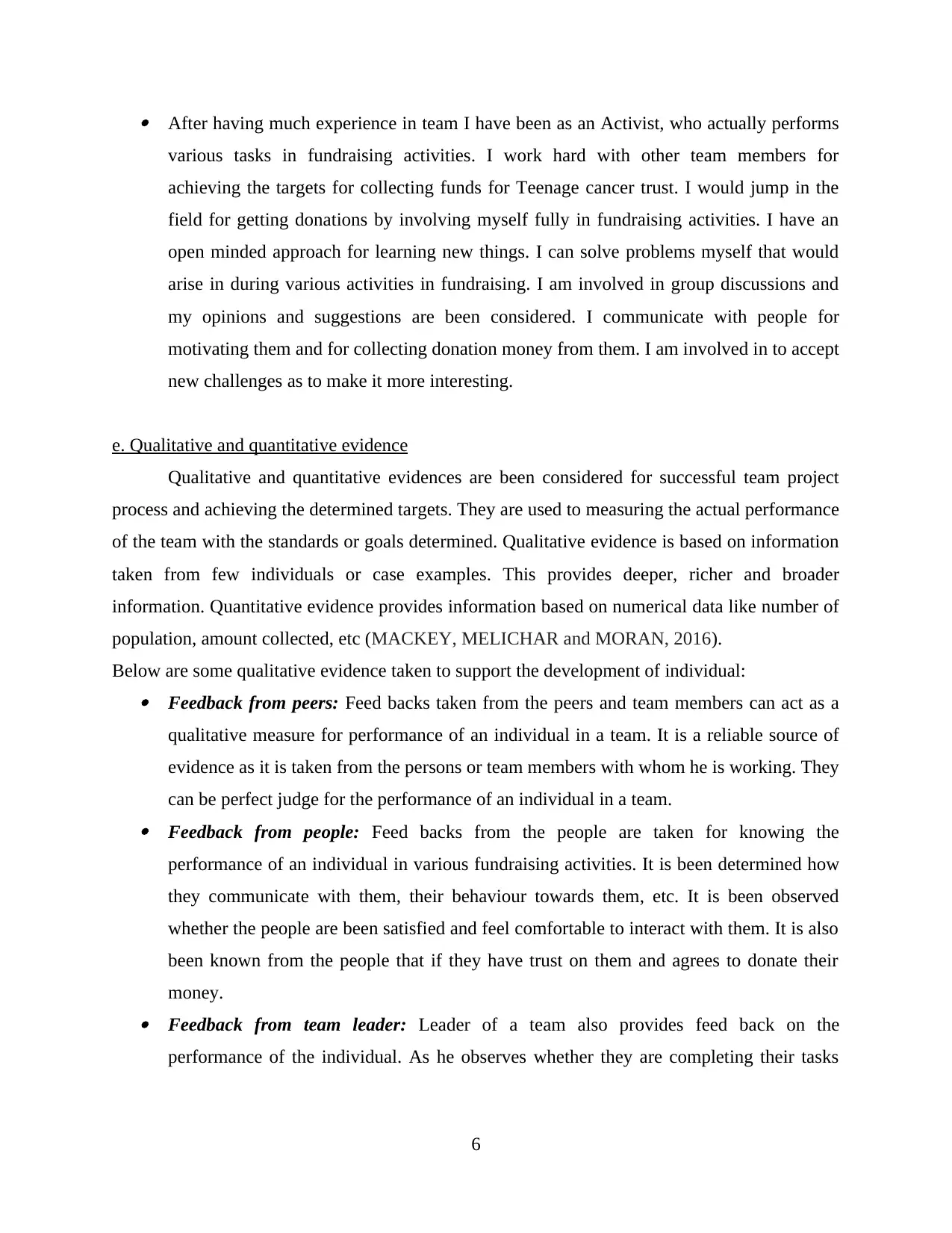
After having much experience in team I have been as an Activist, who actually performs
various tasks in fundraising activities. I work hard with other team members for
achieving the targets for collecting funds for Teenage cancer trust. I would jump in the
field for getting donations by involving myself fully in fundraising activities. I have an
open minded approach for learning new things. I can solve problems myself that would
arise in during various activities in fundraising. I am involved in group discussions and
my opinions and suggestions are been considered. I communicate with people for
motivating them and for collecting donation money from them. I am involved in to accept
new challenges as to make it more interesting.
e. Qualitative and quantitative evidence
Qualitative and quantitative evidences are been considered for successful team project
process and achieving the determined targets. They are used to measuring the actual performance
of the team with the standards or goals determined. Qualitative evidence is based on information
taken from few individuals or case examples. This provides deeper, richer and broader
information. Quantitative evidence provides information based on numerical data like number of
population, amount collected, etc (MACKEY, MELICHAR and MORAN, 2016).
Below are some qualitative evidence taken to support the development of individual: Feedback from peers: Feed backs taken from the peers and team members can act as a
qualitative measure for performance of an individual in a team. It is a reliable source of
evidence as it is taken from the persons or team members with whom he is working. They
can be perfect judge for the performance of an individual in a team. Feedback from people: Feed backs from the people are taken for knowing the
performance of an individual in various fundraising activities. It is been determined how
they communicate with them, their behaviour towards them, etc. It is been observed
whether the people are been satisfied and feel comfortable to interact with them. It is also
been known from the people that if they have trust on them and agrees to donate their
money. Feedback from team leader: Leader of a team also provides feed back on the
performance of the individual. As he observes whether they are completing their tasks
6
various tasks in fundraising activities. I work hard with other team members for
achieving the targets for collecting funds for Teenage cancer trust. I would jump in the
field for getting donations by involving myself fully in fundraising activities. I have an
open minded approach for learning new things. I can solve problems myself that would
arise in during various activities in fundraising. I am involved in group discussions and
my opinions and suggestions are been considered. I communicate with people for
motivating them and for collecting donation money from them. I am involved in to accept
new challenges as to make it more interesting.
e. Qualitative and quantitative evidence
Qualitative and quantitative evidences are been considered for successful team project
process and achieving the determined targets. They are used to measuring the actual performance
of the team with the standards or goals determined. Qualitative evidence is based on information
taken from few individuals or case examples. This provides deeper, richer and broader
information. Quantitative evidence provides information based on numerical data like number of
population, amount collected, etc (MACKEY, MELICHAR and MORAN, 2016).
Below are some qualitative evidence taken to support the development of individual: Feedback from peers: Feed backs taken from the peers and team members can act as a
qualitative measure for performance of an individual in a team. It is a reliable source of
evidence as it is taken from the persons or team members with whom he is working. They
can be perfect judge for the performance of an individual in a team. Feedback from people: Feed backs from the people are taken for knowing the
performance of an individual in various fundraising activities. It is been determined how
they communicate with them, their behaviour towards them, etc. It is been observed
whether the people are been satisfied and feel comfortable to interact with them. It is also
been known from the people that if they have trust on them and agrees to donate their
money. Feedback from team leader: Leader of a team also provides feed back on the
performance of the individual. As he observes whether they are completing their tasks
6
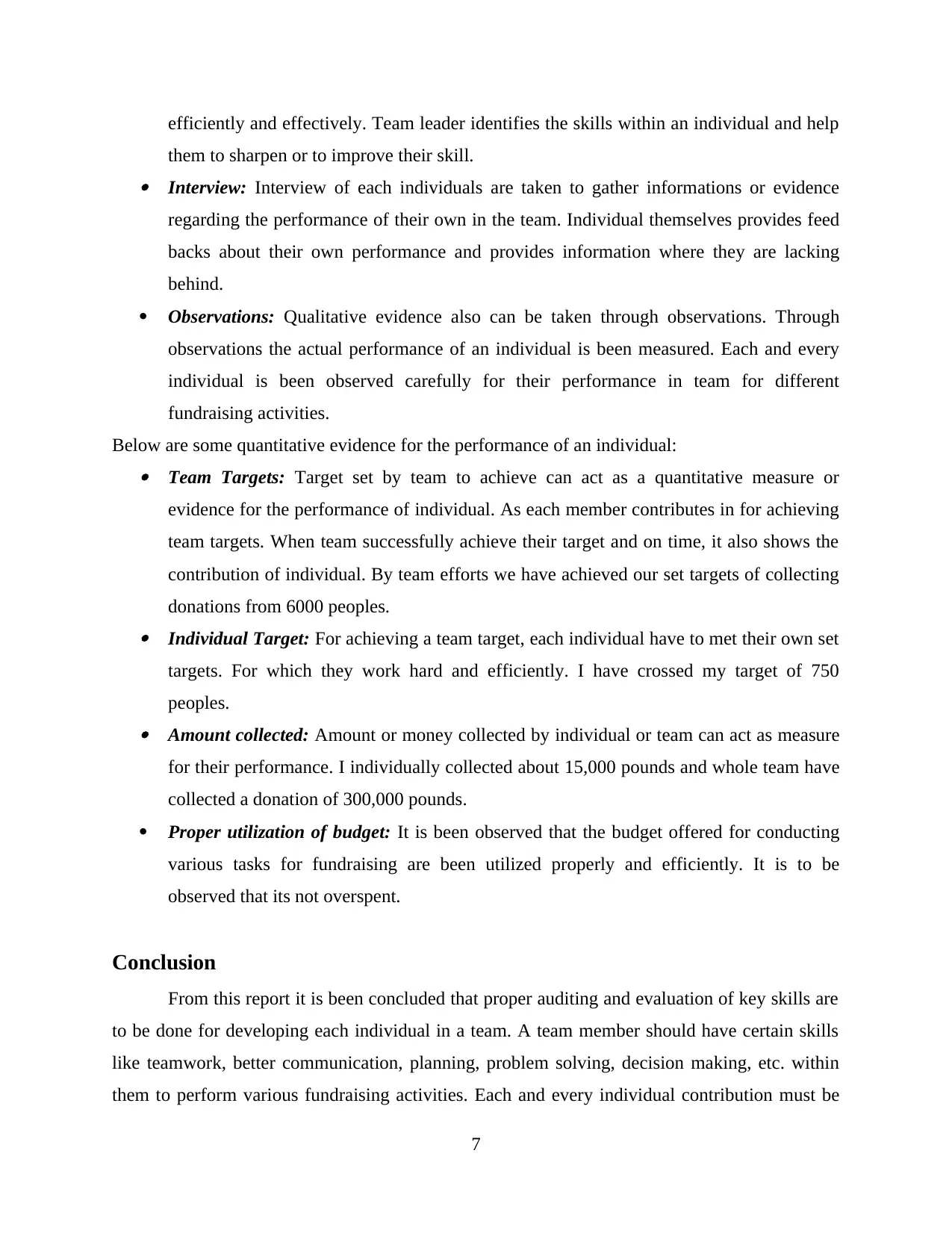
efficiently and effectively. Team leader identifies the skills within an individual and help
them to sharpen or to improve their skill. Interview: Interview of each individuals are taken to gather informations or evidence
regarding the performance of their own in the team. Individual themselves provides feed
backs about their own performance and provides information where they are lacking
behind.
Observations: Qualitative evidence also can be taken through observations. Through
observations the actual performance of an individual is been measured. Each and every
individual is been observed carefully for their performance in team for different
fundraising activities.
Below are some quantitative evidence for the performance of an individual: Team Targets: Target set by team to achieve can act as a quantitative measure or
evidence for the performance of individual. As each member contributes in for achieving
team targets. When team successfully achieve their target and on time, it also shows the
contribution of individual. By team efforts we have achieved our set targets of collecting
donations from 6000 peoples. Individual Target: For achieving a team target, each individual have to met their own set
targets. For which they work hard and efficiently. I have crossed my target of 750
peoples. Amount collected: Amount or money collected by individual or team can act as measure
for their performance. I individually collected about 15,000 pounds and whole team have
collected a donation of 300,000 pounds.
Proper utilization of budget: It is been observed that the budget offered for conducting
various tasks for fundraising are been utilized properly and efficiently. It is to be
observed that its not overspent.
Conclusion
From this report it is been concluded that proper auditing and evaluation of key skills are
to be done for developing each individual in a team. A team member should have certain skills
like teamwork, better communication, planning, problem solving, decision making, etc. within
them to perform various fundraising activities. Each and every individual contribution must be
7
them to sharpen or to improve their skill. Interview: Interview of each individuals are taken to gather informations or evidence
regarding the performance of their own in the team. Individual themselves provides feed
backs about their own performance and provides information where they are lacking
behind.
Observations: Qualitative evidence also can be taken through observations. Through
observations the actual performance of an individual is been measured. Each and every
individual is been observed carefully for their performance in team for different
fundraising activities.
Below are some quantitative evidence for the performance of an individual: Team Targets: Target set by team to achieve can act as a quantitative measure or
evidence for the performance of individual. As each member contributes in for achieving
team targets. When team successfully achieve their target and on time, it also shows the
contribution of individual. By team efforts we have achieved our set targets of collecting
donations from 6000 peoples. Individual Target: For achieving a team target, each individual have to met their own set
targets. For which they work hard and efficiently. I have crossed my target of 750
peoples. Amount collected: Amount or money collected by individual or team can act as measure
for their performance. I individually collected about 15,000 pounds and whole team have
collected a donation of 300,000 pounds.
Proper utilization of budget: It is been observed that the budget offered for conducting
various tasks for fundraising are been utilized properly and efficiently. It is to be
observed that its not overspent.
Conclusion
From this report it is been concluded that proper auditing and evaluation of key skills are
to be done for developing each individual in a team. A team member should have certain skills
like teamwork, better communication, planning, problem solving, decision making, etc. within
them to perform various fundraising activities. Each and every individual contribution must be
7
⊘ This is a preview!⊘
Do you want full access?
Subscribe today to unlock all pages.

Trusted by 1+ million students worldwide
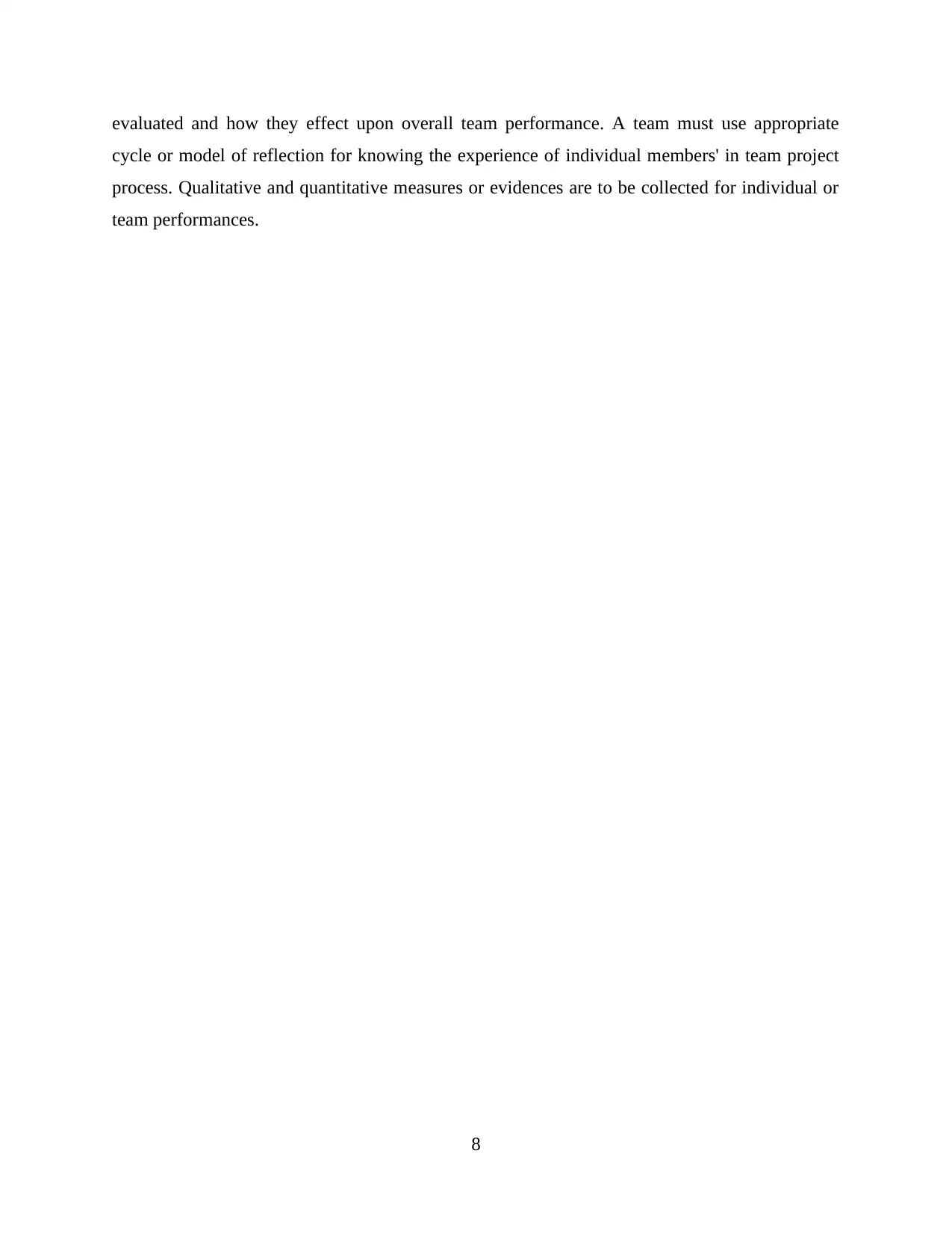
evaluated and how they effect upon overall team performance. A team must use appropriate
cycle or model of reflection for knowing the experience of individual members' in team project
process. Qualitative and quantitative measures or evidences are to be collected for individual or
team performances.
8
cycle or model of reflection for knowing the experience of individual members' in team project
process. Qualitative and quantitative measures or evidences are to be collected for individual or
team performances.
8
Paraphrase This Document
Need a fresh take? Get an instant paraphrase of this document with our AI Paraphraser
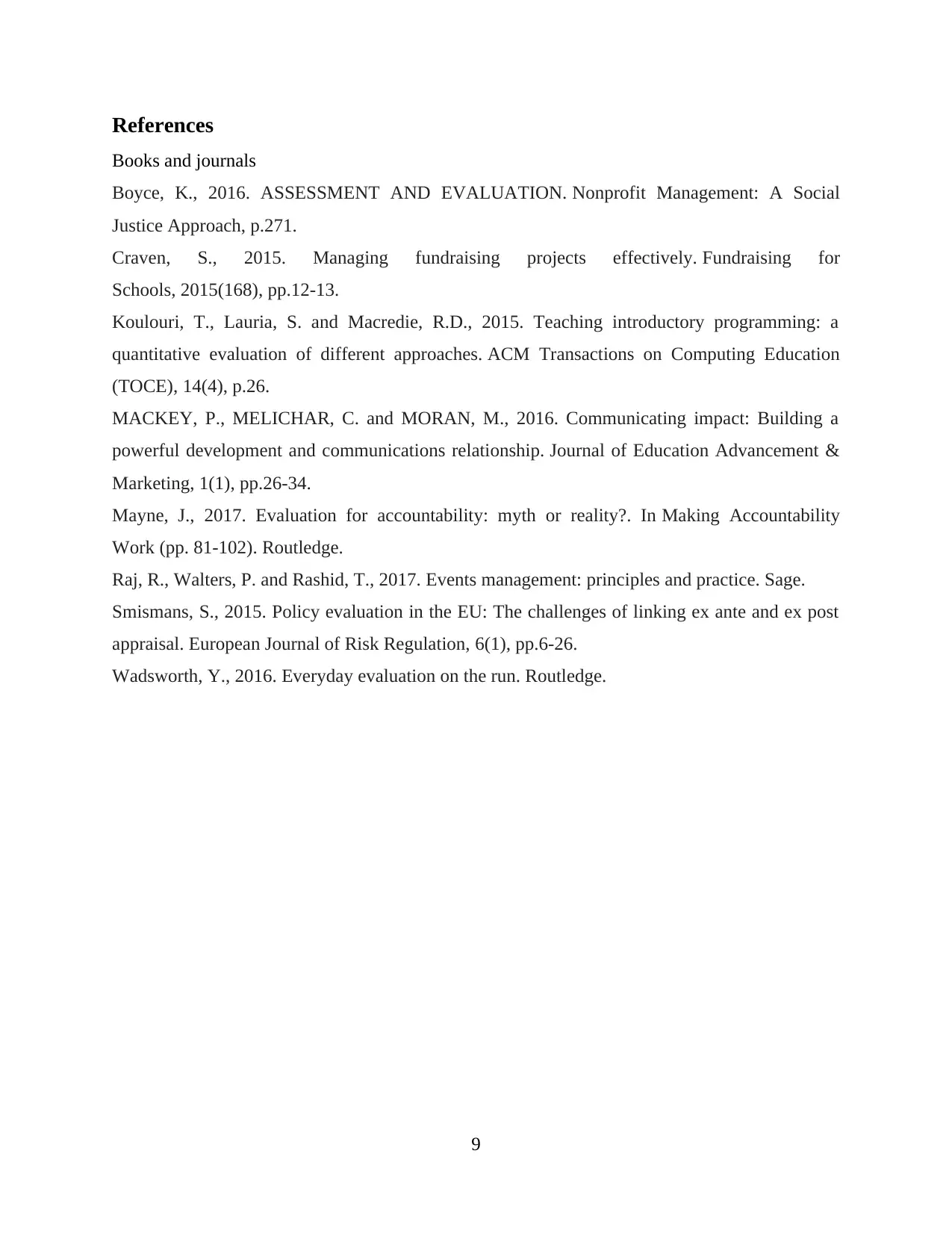
References
Books and journals
Boyce, K., 2016. ASSESSMENT AND EVALUATION. Nonprofit Management: A Social
Justice Approach, p.271.
Craven, S., 2015. Managing fundraising projects effectively. Fundraising for
Schools, 2015(168), pp.12-13.
Koulouri, T., Lauria, S. and Macredie, R.D., 2015. Teaching introductory programming: a
quantitative evaluation of different approaches. ACM Transactions on Computing Education
(TOCE), 14(4), p.26.
MACKEY, P., MELICHAR, C. and MORAN, M., 2016. Communicating impact: Building a
powerful development and communications relationship. Journal of Education Advancement &
Marketing, 1(1), pp.26-34.
Mayne, J., 2017. Evaluation for accountability: myth or reality?. In Making Accountability
Work (pp. 81-102). Routledge.
Raj, R., Walters, P. and Rashid, T., 2017. Events management: principles and practice. Sage.
Smismans, S., 2015. Policy evaluation in the EU: The challenges of linking ex ante and ex post
appraisal. European Journal of Risk Regulation, 6(1), pp.6-26.
Wadsworth, Y., 2016. Everyday evaluation on the run. Routledge.
9
Books and journals
Boyce, K., 2016. ASSESSMENT AND EVALUATION. Nonprofit Management: A Social
Justice Approach, p.271.
Craven, S., 2015. Managing fundraising projects effectively. Fundraising for
Schools, 2015(168), pp.12-13.
Koulouri, T., Lauria, S. and Macredie, R.D., 2015. Teaching introductory programming: a
quantitative evaluation of different approaches. ACM Transactions on Computing Education
(TOCE), 14(4), p.26.
MACKEY, P., MELICHAR, C. and MORAN, M., 2016. Communicating impact: Building a
powerful development and communications relationship. Journal of Education Advancement &
Marketing, 1(1), pp.26-34.
Mayne, J., 2017. Evaluation for accountability: myth or reality?. In Making Accountability
Work (pp. 81-102). Routledge.
Raj, R., Walters, P. and Rashid, T., 2017. Events management: principles and practice. Sage.
Smismans, S., 2015. Policy evaluation in the EU: The challenges of linking ex ante and ex post
appraisal. European Journal of Risk Regulation, 6(1), pp.6-26.
Wadsworth, Y., 2016. Everyday evaluation on the run. Routledge.
9
1 out of 11
Related Documents
Your All-in-One AI-Powered Toolkit for Academic Success.
+13062052269
info@desklib.com
Available 24*7 on WhatsApp / Email
![[object Object]](/_next/static/media/star-bottom.7253800d.svg)
Unlock your academic potential
Copyright © 2020–2026 A2Z Services. All Rights Reserved. Developed and managed by ZUCOL.



